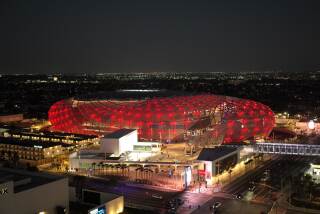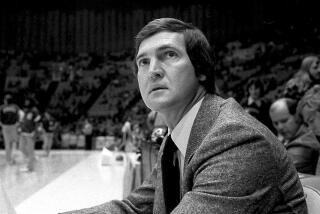Doing It by Word of Mouth
- Share via
When Jack Kent Cooke bought the Lakers--for $5.75 million cash--in the fall of 1965, he knew what the team needed. Everyone did: a big man in the pivot. Someone who could put them over the top, protect his investment.
The Lakers had been coming up a bucket short to the Boston Celtics, one jump shot short of credibility, acceptability.
So, Jack went out and got his pivotal man. He got the guy the Lakers needed. In one stroke, he removed them from the fourth- or fifth-best sports attraction in L.A. to first, or a tie for first.
It was a daring move. He signed a guy who never played a day in the National Basketball Assn., never poured in 50 points a game, never sunk a jumper from the top of the key, blocked a Wilt Chamberlain stuff or taken the ball away from Oscar Robertson on the offensive boards.
Jack Kent Cooke got Francis Dayle Hearn, not to lead the fast break but to tell the world about it.
Cooke knew he had the most exciting game in town but he had trouble getting other people to realize it. Only a couple of columnists in town paid any attention to it. The game itself, like everything else, was an import to Southern California. It was an Eastern city game played on the blacktop in crowded playgrounds and it was doubtful it could catch on with a population whose idea of sport was a surfboard, a hot rod, or a muscle show.
Walter Winchell used to have a (self-serving) saying: “Other people make it known, I make it public.”
That’s what Jack Kent Cooke hired Chick Hearn to do--to make his game as public as the Dodgers, the Rams, the Trojans or the Bruins.
No game can succeed long without frenetic media attention and Cooke knew this as well as Branch Rickey, Tex Rickard, Mike Jacobs, George Halas or any of the other great sports entrepreneurs of history. The symbiotic relationship of show biz, sports and media was as well known to him as to P.T. Barnum.
The Lakers found this out, dramatically. In their first season here, 1960-61, the team did well enough to get into the divisional playoff finals but the public was confused as to their importance. One playoff game had to be played at a junior college and another drew only 2,400 customers.
The then-management of the Lakers, owner Bob Short and General Manager Lou Mohs, tried to get a television hookup for a playoff game in St. Louis. TV was not possible but when they approached Chick Hearn, he suggested sending the game back to L.A. on the radio.
All Chick needed was 48 minutes to hype the game into World War III, and when the Lakers came back to L.A., 15,000 people jammed the Sports Arena ready to see those St. Louis dogs get theirs from our heroes.
Chick Hearn, at the time, was a young man on the way to the top in network broadcasting. He did college football games, U.S. Opens, Rose Bowl games. Chick never met a game he didn’t like. Or that he let on he didn’t like.
Cooke wanted to harness this invaluable enthusiasm exclusively for the Lakers. But, at the time, Chick had a nightly sports show--in the beginning, the Lakers had to rush him by helicopter to his Burbank studios as soon as the last Klaxon sounded in the Sports Arena--and such a busy network schedule it was full of conflicts.
Hearn was not sure he wanted that exclusive identification with the Lakers, but Cooke was typically persuasive. Hearn became an officer in the company, Cooke made the deal lucrative enough and Chick Hearn became as much the heart and soul of the Lakers as Jerry West, Elgin Baylor, Pops Selvy, Rudy La Russo, Hot Rod Hundley, Tommy Hawkins or any who came later.
Sharp-tongued, demanding, critical, Chick was never a homer. He was as merciless on the home team when they threw in a clunker as any ceiling-seat fan. Chick had played the game himself--in the days when the AAU was the game in this country and the NBA was just a struggling circus act to which people came to go to the dance or concert afterward.
He has seen the league grow from the days when it had to schedule doubleheaders to lure a respectable crowd and when the NBA game was often a walk-in for a Globetrotter exhibition afterward.
“Bob Cousy and the 24-second clock saved the game,” Hearn says today.
Chick Hearn didn’t do bad.
As the economics improved and guys like Hearn were able to lure top dollars in the arenas, there was a trickle-down effect in which basketball was able to compete financially for the services of super athletes. Youngsters who excelled on the playgrounds were encouraged to take their talents to college. All of a sudden, the best basketball games in the world were no longer being played in the ghettos of New York and Philadelphia but on the hardwood floors of the NCAA and NBA. Chick’s contributions to the rise of basketball cannot be minimized. He brought a color and a flair to his descriptions unmatched on any microphone or simulcast. A simple dribble became a yo-yo, a dunk became a slam dunk. He drew word pictures of the action. Players became power forwards. Playmakers became point guards or off-guards. Someone else may have designated a strategy as high post or low post, but Chick made it public.
They’re honoring Chick at a banquet-roast at the Beverly Hilton Thursday night. The B’nai B’rith Anti-Defamation League is sponsoring the event and the ADL and Chick Hearn make two public institutions worthy of our salute.
Does Chick have any regrets over the turn of his career, which took him to almost sole identity with the Lakers?
“I really think we have the most exciting game in town and I think the most exciting team,” Chick says. “They do things that astound me. I have never been bored for a minute.”
Neither has his public. The ADL has picked the right man. There are some young athletes who think of the media as the barnacle on the whale. Little do they know. With knowing people, it is the game that’s the barnacle.
More to Read
All things Lakers, all the time.
Get all the Lakers news you need in Dan Woike's weekly newsletter.
You may occasionally receive promotional content from the Los Angeles Times.






